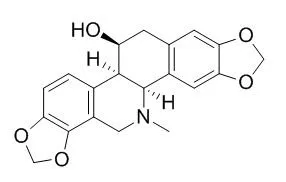| Kinase Assay: |
| Mol Med Rep. 2015 Aug;12(2):2161-8. | | Chelidonine suppresses migration and invasion of MDA-MB-231 cells by inhibiting formation of the integrin-linked kinase/PINCH/α-parvin complex.[Pubmed: 25890994] | Metastasis is the primary cause of cancer-associated mortality. The ternary IPP complex of integrin-linked kinase, PINCH and parvin functions as a signaling platform for integrins, which modulate numerous cellular processes including cell migration and invasion. Chelidonine, isolated from Chelidonium majus, is a benzophenanthridine alkaloid that exhibits anticancer properties; however, the anti‑migratory and anti‑invasive effects of Chelidonine remain unknown.
METHODS AND RESULTS:
The aim of the present study was to investigate the inhibitory effects of Chelidonine on migration and invasion of MDA‑MB‑231 human breast cancer cells, and to determine the underlying mechanisms. Chelidonine was shown to inhibit the migration and invasion of MDA‑MB‑231 cells in a concentration‑dependent manner, without affecting the cell viability. Chelidonine did not significantly inhibit the adhesion of the cells to type 1 collagen (COL‑I), however it did affect cell spreading and reorganization of the actin cytoskeleton. Chelidonine also inhibited COL‑I‑induced protein kinase B (Akt) activation and translocation to the plasma membrane, however, it did not significantly inhibit the activation of focal adhesion kinase. Notably, Chelidonine treatment significantly inhibited COL‑I‑induced formation of the IPP complex and activation of IPP downstream signaling molecules, such as extracellular signal‑regulated kinase (ERK)1/2.
CONCLUSIONS:
These results suggest that Chelidonine exhibits anti‑migratory and anti‑invasive effects in MDA‑MB‑231 cells, by suppressing COL‑I‑induced integrin signaling, through inhibiting the formation of the IPP complex and subsequent down‑regulation of IPP downstream signaling molecules, such as Akt and ERK1/2. These results suggest that Chelidonine may be a potential therapeutic agent against metastasis of invasive human cancer cells. | | Zhong Xi Yi Jie He Xue Bao. 2012 Sep;10(9):1025-38. | | Chelidonine isolated from ethanolic extract of Chelidonium majus promotes apoptosis in HeLa cells through p38-p53 and PI3K/AKT signalling pathways.[Pubmed: 22979935] | To evaluate the role of Chelidonine isolated from ethanolic extract of Chelidonium majus in inducing apoptosis in HeLa cells and to assess the main signalling pathways involved.
METHODS AND RESULTS:
Cells were initially treated with different concentrations of Chelidonine for 48 h and the median lethal dose (LD50) value was selected by 3-(4,5-dimethylthiazol-2-yl)-2,5-diphenyltetrazolium bromide assay. Morphological analysis of nuclear condensation and DNA damage and fragmentation were measured by 4',6-diamidino-2-phenylindole staining and comet assay. Further, reactive oxygen species (ROS) generation, cell cycle arrest and change in mitochondrial membrane potential were also examined and analyzed by flow cytometry. Evaluation of interaction of drug with CT DNA was investigated by circular dichroism (CD) spectral analysis to find any possible drug-CT DNA interaction. The mRNA and protein expressions of major signal proteins like p38, p53, protein kinase B (AKT), phosphatidylinositol 3-kinases (PI3K), Janus kinase 3 (JAK3), signal transducer and activator of transcription 3 (STAT3) and E6 and E7 oncoproteins as well as the pro-apoptotic genes and antiapoptotic genes were also estimated by reverse transcriptase-polymerase chain reaction and Western blotting. Based on LD(50) value (30 μg/mL) of Chelidonine, three doses were selected, namely, 22.5 μg/mL (D1), 30.0 μg/mL (D2) and 37.5 μg/mL (D3). Results showed that Chelidonine inhibited proliferation and induced apoptosis in HeLa cells through generation of ROS, cell cycle arrest at sub-G1 and G0/G1 stage, change in mitochondrial membrane potential and fragmentation of DNA. Results of CD spectra showed effective interaction between Chelidonine and calf thymus DNA. Studies of signalling pathway revealed that Chelidonine could efficiently induce apoptosis through up-regulation of expressions of p38, p53 and other pro-apoptotic genes and down-regulation of expressions of AKT, PI3K, JAK3, STAT3, E6, E7 and other antiapoptotic genes.
CONCLUSIONS:
Chelidonine isolated from Chelidonium majus efficiently induced apoptosis in HeLa cells through possible alteration of p38-p53 and AKT/PI3 kinase signalling pathways. |
|






 Cell. 2018 Jan 11;172(1-2):249-261.e12. doi: 10.1016/j.cell.2017.12.019.IF=36.216(2019)
Cell. 2018 Jan 11;172(1-2):249-261.e12. doi: 10.1016/j.cell.2017.12.019.IF=36.216(2019) Cell Metab. 2020 Mar 3;31(3):534-548.e5. doi: 10.1016/j.cmet.2020.01.002.IF=22.415(2019)
Cell Metab. 2020 Mar 3;31(3):534-548.e5. doi: 10.1016/j.cmet.2020.01.002.IF=22.415(2019) Mol Cell. 2017 Nov 16;68(4):673-685.e6. doi: 10.1016/j.molcel.2017.10.022.IF=14.548(2019)
Mol Cell. 2017 Nov 16;68(4):673-685.e6. doi: 10.1016/j.molcel.2017.10.022.IF=14.548(2019)